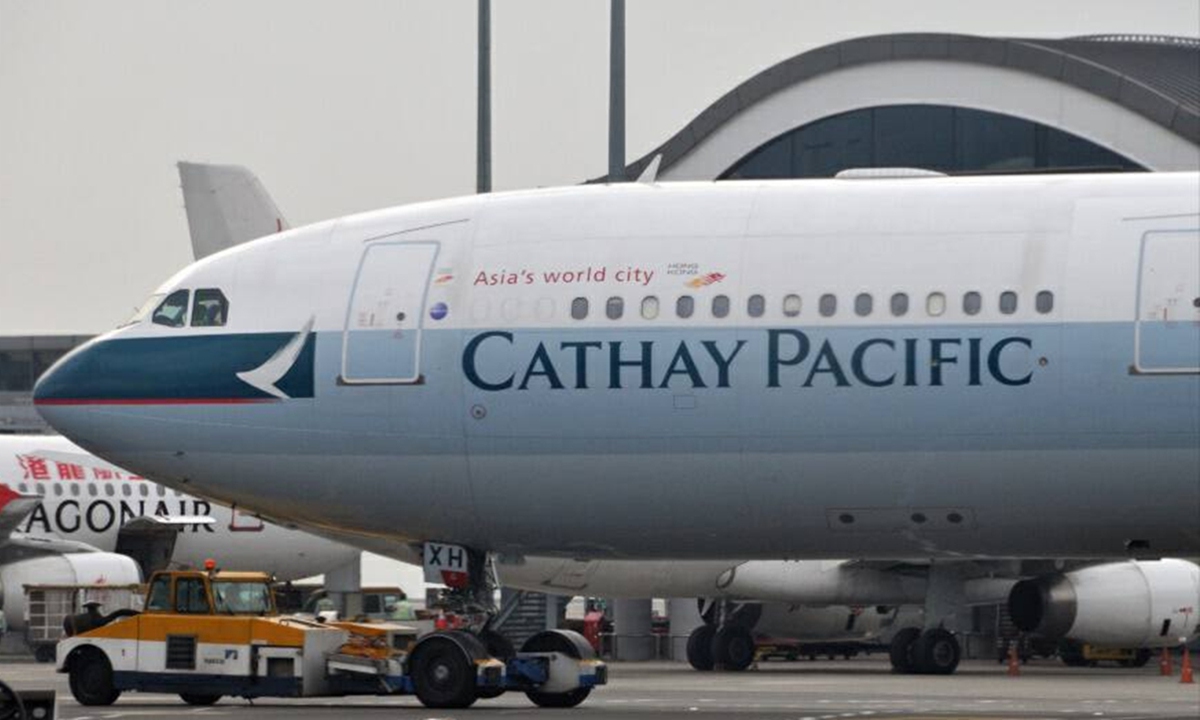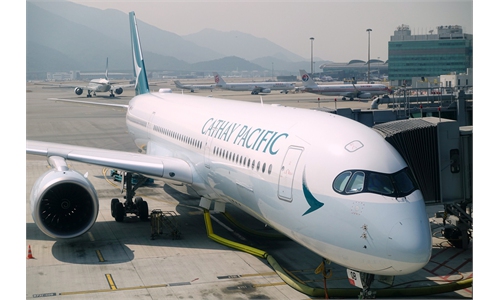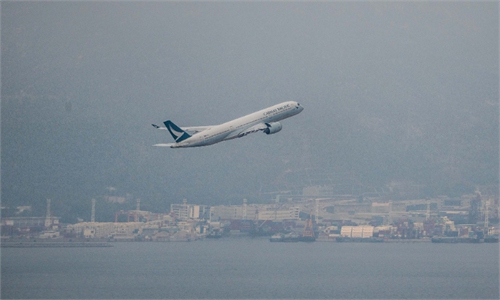
A Cathay Pacific Airways plane. File photo: IC
"If you cannot speak blanket in English, you cannot have it." The discriminatory words of a crew member of Hong Kong-based Cathay Pacific toward a passenger, followed by a burst of laughter, triggered widespread discussions and anger on the internet. It is 2023. Yet there is a small proportion of Hong Kong people who are mentally stuck in the era of colonial rule, and have forgotten what their mother language is.
The episode - a passenger being laughed at by crew members for mixing up the words "carpet" and "blanket" - occurred on a flight from Chengdu to Hong Kong on Sunday. Some reports are being subtle, saying it is discrimination against non-English speakers. Imagine, if the passenger could only speak French or German, would they be mocked? Apparently no. They were mocked because those crew members discriminate against Putonghua speakers.
Over the past few days, more and more netizens shared their unpleasant experiences with Cathay Pacific flights, noting some flight attendants communicate with passengers in English and Cantonese throughout the entire flight, pretending to not be able to speak Putonghua at all. Some airline stewardesses are indifferent and impatient toward mainland passengers.
Cathay Pacific fired three cabin crew members involved in the case. On Wednesday, the airline apologized for the fourth time. On the same day, Hong Kong Special Administrative Region (HKSAR) Chief Executive John Lee Ka-chiu said relevant flight attendants' words and deeds have hurt the feelings of the people of Hong Kong and the mainland, undermining Hong Kong's culture and values of respect and courtesy.
Even Hong Kong people find the news appalling. Their extremely unprofessional behavior is shocking, and their blatant discrimination is unacceptable, Lawrence Tang Fei, a lawmaker who is also the vice-chairman of the Hong Kong Federation of Education Workers, told the Global Times.
Treating customers equally, responding to their needs appropriately, and providing appropriate service are supposed to be the most basic standards in the service industry. However, flight attendants of a Hong Kong-based airline, whose main customers and revenue come from the mainland, who clearly understand Chinese, are displaying an allergy to Putonghua, as if those speaking English are superior and others are uncultured.
It has been nearly 26 years since Hong Kong returned to the motherland. Granted, there have been some waves in between. But now, the city has returned to tranquility after the implementation of the National Security Law for Hong Kong, and entered a new stage of development and prosperity. However, in Cathay Pacific, there are still individuals harboring outdated mindset, and worse, holding onto a culture of disdain.
It reflects a deep-rooted issue in Hong Kong society. Even after the colonial rule ended, some Hong Kong people still have blind faith in foreign things and culture. They have no idea of the current development on the Chinese mainland, believing the latter is still poor and backward. Neither do they have any interest to get to know it, said He Liangliang, a commentator with the Hong Kong-based Phoenix TV.
These people fail to realize that Hong Kong is a part of China, and its future lies with China.
He also noticed that with the rapid development of China's modernization and the significant improvement in its international status, the economic and social development gap between the mainland and Hong Kong is gradually narrowing. In addition, compared to neighboring Shenzhen, Hong Kong has fallen behind in certain aspects. This is a fact that can be felt by Hong Kong people who have visited Shenzhen.
Some Hong Kong people who have immigrated to the UK complain on social media about the inefficiency and backwardness of local government institutions and public services, which has prompted reflection among many people in Hong Kong. This is a stark contrast that highlights the irony when some are still worshiping the West.
Cathay Pacific's apologies and responding approach is a step in the right direction. After the return, Hong Kong people are supposed to have stronger national identity. All Chinese people, wherever they are from, are supposed to be able to speak Putonghua freely and confidently on any parts of Chinese soil, including in Hong Kong.
It will take some time to go before people's biases and stereotypes can be changed. It requires efforts from various sectors, including the government, public opinion, and educational fields, to clean up outdated and harmful elements that stand in the way of boosting China's national identity.


